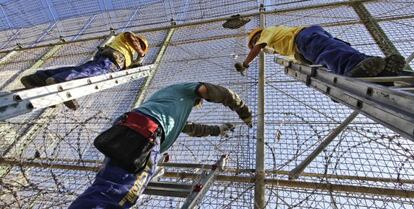Government to keep wire on Melilla fence
Interior Ministry report plays down potential danger of measure, The aim is to prevent mass attempts to scale Spanish exclave's border with Morocco


Prime Minister Mariano Rajoy now has the report that he asked for as to whether the razor wire on top of the fence that extends around the Spanish city of Melilla in North Africa - placed there to further dissuade migrants from attempting to enter the city from Morocco - "will cause harm to people." Spain removed the wire in 2007 after numerous people were injured trying to scale the fence, but replaced it earlier this month after a wave of attempts over the summer, sometimes by hundreds of migrants at a time, to enter Spain.
The Interior Ministry says that it intends to keep the razor wire in place around a third of the 11-kilometer fence and has given Rajoy a report justifying the use of the measure by arguing that razor wire is used in many other locations, such as prisons and nuclear power plants.
The scale of pressure this year from migrants trying to enter Melilla, and to a lesser extent Spain's other territory in Morocco, Ceuta, has been similar to 2005, when former Prime Minister José Luis Rodríguez Zapatero ordered the razor wire to be installed. A year later, Zapatero promised to take it down because of the injuries being suffered by would-be immigrants. It was finally removed in 2007 and substituted with a three-dimensional structure, which is sometimes described as the "third wall."
The government has so far refused to supply the media with a copy of the Interior Ministry's report. Sources say that it argues that razor wire produces only superficial wounds, noting that it is used in Spanish jails. The same sources say that there have been 46 escape attempts from jails where razor wire is used during which 16 people were injured, none of them seriously, and that the wire is a major factor in dissuading prisoners from trying to escape.
Human rights groups at home and abroad have protested the reintroduction of the measure, prompting Rajoy to say in a radio interview on Thursday that he was prepared to wait until the ministry had finished its report before making a decision. Government sources say that Interior Minister Jorge Fernández Díaz, who has insisted that the razor wire remain in place, will likely win out.
The Interior Ministry says that the government intends to install "exactly the same" razor wire that was placed atop the fence in 2005 and has "no intention" of "backing down." It also pointed out that razor wire is used in Brussels to prevent access to EU summits.
The wire was removed from the Melilla fence in 2007 after several injuries
Deputy Prime Minister Soraya Sáenz de Santamaría has evaded journalists' questions on the matter, saying only that the prime minister would study the "very detailed report from all angles." Observers say that the government is hoping that the controversy will die down in the coming days, allowing the Interior Ministry to press ahead with replacing the wire.
Socialist Party leader Alfredo Pérez Rubalcaba, who was an interior minister in the Zapatero administration, has called for the wire to be removed, highlighting the threat to safety. "Blades cut people. There is no need for a report on this; the government can learn from the experience of previous ministers. This is an inhumane measure," he said in a radio interview, suggesting that the prime minister save the money for a report on the razor wire by calling him that afternoon: "I can tell him free of charge."
Elena Valencia, the Socialist Party's number two, said she would be calling on the European Commission to make a ruling on the use of razor wire in Melilla and Ceuta.
The Roman Catholic Church's General Synod of Bishops has also opposed the reintroduction of razor wire to prevent would-be migrants entering Spanish territory from Morocco. José María Gil Tamayo, the body's new secretary general and spokesman, said: "This is no way to combat immigration; we call on the government to avoid this extreme measure. I am the son of Spanish immigrants to Germany; immigrants are not a danger to anybody."
Meanwhile, the State Prosecutor's office has called for an investigation into the matter. Eduardo Torres-Dulce, the Attorney General, said on Wednesday: "I have given instructions to open an investigation because this is not a procedure that has fully taken the law into account and raises questions about human treatment."
The razor wire remains in place on the lower part of the fence ringing Melilla, as well as around the entire perimeter of Ceuta. It will now be installed in the upper part of the Melilla fence, with work expected to be finished by the end of November.
Wooden ladders and human shields
If the investigation by Attorney General Eduardo Torres-Dulce concludes that the use of razor wire on the fences surrounding Melilla and Ceuta is illegal, then they will have to be removed.
The Moroccan side of the Melilla fence, which is barely three meters high, is topped with razor wire. Migrants, most of whom are from sub-Saharan Africa, now use makeshift wooden ladders to get over the Moroccan side. Until it was removed in 2007, once atop the fence they would then either use blankets or padded clothing to try to reduce the cuts inflicted by the razor wire.
There have even been occasions when an individual would place themselves on the wire, protecting other would-be migrants, allowing them to pass over his body and resulting in serious injury.
The 8.2-kilometer fence in Ceuta has been topped with razor wire for the last eight years, prompting few protests. But pressure from migrants desperate to enter Spain through Ceuta is not as great as in the case of Melilla.
Ceuta is much further than Melilla from the Algerian border, through which come around 95 percent of sub-Saharan migrants. Making the journey across the north of Morocco to get to Ceuta increases the risk of being captured by the Moroccan authorities, while the rough terrain around Ceuta is another factor that makes it a less attractive option.
Instead of trying to scale the fence, most of those seeking to enter Spanish territory try to do so by running across the land border: 400 people tried to do so on October 17, and also by swimming to the exclave from nearby beaches. There are reports of Moroccans living in nearby Tetuán teaching would-be migrants how to swim. Spanish authorities now say they intend to extend the barrier out into the sea.
However, mass attempts to rush the fence have increased during the summer, with up to 200 would-be migrants making a bid in September. More than 100 managed to scale the barrier into Melilla but a man was killed falling from the Moroccan side of the fence.
Tu suscripción se está usando en otro dispositivo
¿Quieres añadir otro usuario a tu suscripción?
Si continúas leyendo en este dispositivo, no se podrá leer en el otro.
FlechaTu suscripción se está usando en otro dispositivo y solo puedes acceder a EL PAÍS desde un dispositivo a la vez.
Si quieres compartir tu cuenta, cambia tu suscripción a la modalidad Premium, así podrás añadir otro usuario. Cada uno accederá con su propia cuenta de email, lo que os permitirá personalizar vuestra experiencia en EL PAÍS.
En el caso de no saber quién está usando tu cuenta, te recomendamos cambiar tu contraseña aquí.
Si decides continuar compartiendo tu cuenta, este mensaje se mostrará en tu dispositivo y en el de la otra persona que está usando tu cuenta de forma indefinida, afectando a tu experiencia de lectura. Puedes consultar aquí los términos y condiciones de la suscripción digital.








































